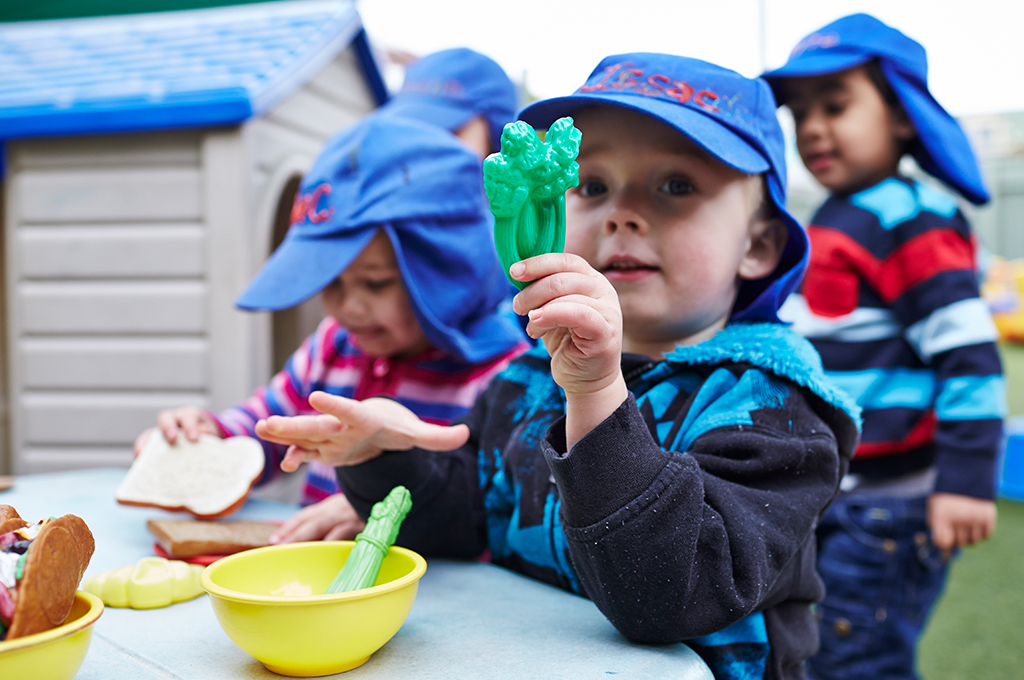

Discover childhood nutrition basics with our nutrition guide for parents in Australia. Learn about essential nutrients for children, healthy eating tips, and how Clovel Childcare supports children’s growth and development through nutritious meals. Working together can foster healthy eating habits in our children that last a lifetime.


Understanding childhood nutrition basics and how they impact children’s physical and cognitive development is critical to meeting child dietary requirements. Clovel Childcare supports healthy eating through carefully designed nutrition and meal programs and engaging children with wholesome ingredients.
Key Nutrients for Physical and Mental Development
Child dietary requirements revolve around the following fundamental elements:
As our body’s building blocks, proteins help build and repair tissue, produce essential digestion enzymes, and handle everything from hormone regulation to bolstering immune systems. Proteins are used as an energy source when others are unavailable and facilitate the movement and storage of nutrients. Some excellent, healthy sources include:

Vitamins are crucial for child nutrition and health, each playing a unique role as follows:
A cornerstone of skin health, vision, and immune function.
Aids energy production, enhances brain function, and facilitates red blood cell formation.
Critical for growing and repairing tissue, aiding immune function, and absorbing iron efficiently.
Fundamental to bone health, allowing the body to absorb calcium.
A potent antioxidant that protects cells from damage and supports skin health and immune function.
Aids blood clotting and enhances bone health.
Each vitamin has its benefits, and a balanced diet with lots of differently-coloured fresh fruits and vegetables is crucial to providing the proper amounts.
Children need minerals to help them grow and develop, aiding overall health.
Some critical minerals and their essential functions include:
For strong bones and teeth
For making haemoglobin to carry oxygen in the blood
For optimal muscle function and healthy nervous systems.
For a robust immune system, rapid cell growth, and efficient wound healing
For hundreds of biochemical reactions, including muscle function and energy production
For proper metabolism and thyroid function
For strong bones and teeth (in partnership with calcium)

Fats are essential for children’s bodies in the following ways:
Healthy fats to include in your children’s diet include:
Carbohydrates play several crucial roles in child dietary requirements, including:
Carbohydrates are our primary energy source as they break down into glucose and fuel cells.
The brain relies heavily on glucose to maintain peak mental acuity and cognitive function.
Carbohydrates fuel our muscles and are critical during physical activity.
Carbohydrates contain dietary fibre, which aids digestion and helps achieve and maintain excellent gut health.
Complex carbohydrates release glucose steadily into the bloodstream, preventing the rapid energy spikes/crashes often observed when children consume processed versions.
Some fantastic carbohydrates that provide essential nutrients for kids include:
Dairy products are among the childhood nutrition basics vital for general health and bone development. Prime examples include:
When you enrol your children in our baby or preschool program, they will be exposed to nutrition and meals that are designed to be delicious and enticing while conforming to the fundamentals of healthy eating for children.

Australian government recommendations and guidelines on healthy eating for children are as follows:
Dealing with picky eaters can be challenging, but fussy children will often grow out of their foibles and develop a more varied and balanced diet with patience and persistence. Some tips to encourage healthy eating habits include:
Involve children in meal planning, shopping, and preparation
Provide a wide variety of foods
The more variety children are exposed to early in life, the more likely they will encounter something appealing.
Be patient
Children can be exceptionally stubborn, and it can often take multiple efforts before they accept something.
Make mealtimes fun and engaging
Present food in fun, creative, and colourful ways.
Set the example
Children naturally mimic their parents, and eating habits are no exception.
Avoid pressure/bribes
These can create negative associations, whereas gentle encouragement and praise create positive ones.
Make mealtimes special, pleasant, and stress-free
Eliminate distractions and have conversations without the TV or toys and devices at the table.
Don’t force it
If children tell you they’re not hungry, forcing them to eat is of little use.
Be consistent
Even if healthy foods are constantly rejected, keep offering them and demonstrating how delicious they are.


The Clovel Philosophy is founded on love and nurturing, and we believe that providing healthy eating for children is among the most crucial ways we can express that love.

If you’re ready to learn more about Clovel and our thoughts and policies regarding healthy eating for children, please reach out to our friendly representatives today.

Lyn Connolly is the Founder and Company Director of Clovel Childcare & Early Learning Centres, a family‑owned group of eight centres across Western Sydney established from her first service at Merrylands. Active in early childhood education since 1977, she also serves as President of the Australian Childcare Alliance (ACA) NSW, representing providers in state and federal consultations, media, and public hearings.
Choosing your child’s childcare and early learning centre is one of the biggest decisions you will ever have to make for your child. If you have more questions for us or would like to book a tour of one of our centres, please fill out our form and we’ll be in touch!






Join our Clovel newsletter to keep up to date with the latest news, blogs, tips & advice or follow us on YouTube, Facebook and Instagram.